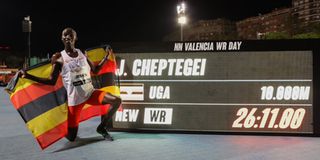Premium
Sports and technology, a case of very strange bedfellows

Ugandan Joshua Cheptegei poses with the clock after setting a new world record in the 10,000 metres in Valencia, Spain on October 7, 2020.
What you need to know:
- Just like in athletics, football fans have been scandalised by innovation, particularly so the coming into being of the Video Assistant Referee (VAR).
- Tragically, VAR, which was meant to right all the historical injustices of the beautiful game has turned out to be an erratic, inconsistent and disruptive piece of innovation.
Joshua Cheptegei is the man of the moment, and rightfully so. In a space of two months he has done what so many athletes before him were unable to do in 15 years.
First, on August 14, during the Monaco Diamond League, the Ugandan erased Kenenisa Bekele’s 5,000 metres world record that had stood for 16 long years.
He stopped the clock at 12 minutes, 35.36 seconds, which was 2 seconds faster than Bekele’s old record. For the records, that 16-year period that Bekele’s record stood unchallenged was the longest duration in the history of the event.
And even before the ink had dried on the record books, mid this week Cheptegei chalked up another majestic performance at the one-off NN Valencia World Record Day in the Spanish city of Valencia as he smashed into smithereens yet another of Bekele’s longstanding record.
This time, Cheptegei clocked 26 minutes 11.00 seconds to obliterate the Ethiopian legend’s 15-year-old record in 10,000m by slicing an astonishing six seconds off the old mark.
Remarkably, Cheptegei’s supreme performance came after Ethiopia’s Letesenbet Gidey slashed four seconds off Tirunesh Dibaba’s previous record in women’s 5,000m which was set in 2008.
It is the manner in which Cheptegei and Gidey blew up these records, though, that has stirred up a storm in athletics, reason being their performances were aided by Nike’s controversial track spikes and the Wavelight technology – a trackside visual time guidance system which lights up to indicate the desired world record pace.
Before them, Sir Mo Farah and Ethiopian-born Dutch runner Sifan Hassan had smashed the men and women’s one-hour records, while also running on Nike spikes and guided by Wavelight.
Speaking of shoes, Nike’s cutting edge innovation footwear is at the center of a raging debate that has divided opinion in the sport. So much so that Nike’s range of running shoes, featuring carbon plates and unique foam, have even been equated to mechanical doping.
The debate, which has drawn in marathon legend Eliud Kipchoge, is unlikely to end anytime soon, so long as World Athletics permits the use of such footwear in global competitions.
Which explains the brouhaha that greeted Cheptegei’s latest accomplishment.
Ladies and gentlemen, it’s now official that athletics has gone to bed with technology and their healthy offspring have started arriving.
It has to be said, though, that athletics’ flirtation with technology, which has so enraged many, runs in the (sporting) family. Athletics’ most prominent siblings – Tennis, Cricket, Swimming and Rugby – went the technology route a long time ago.
Even football, the beautiful game, has lately found it hard to resist technology’s seductive overtures.
Just like in athletics, football fans have been scandalised by innovation, particularly so the coming into being of the Video Assistant Referee (VAR).
Tragically, VAR, which was meant to right all the historical injustices of the beautiful game has turned out to be an erratic, inconsistent and disruptive piece of innovation.
Still wondering why I say sports and technology are strange bedfellows?




